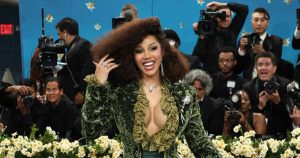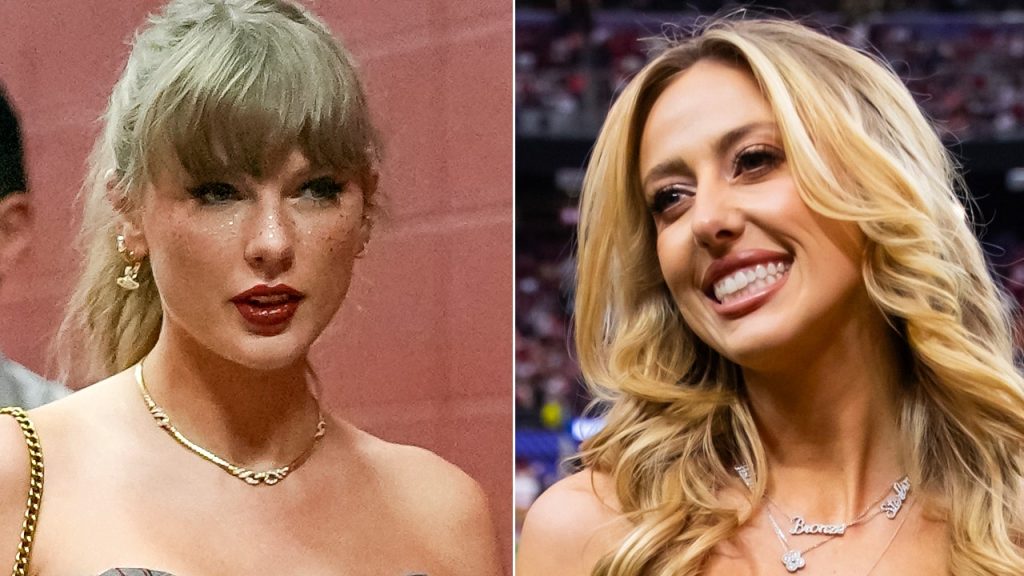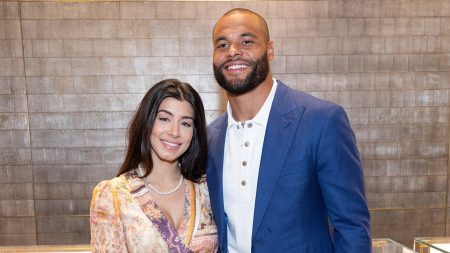The reported exchange of a hand-knitted baby blanket from Taylor Swift to Brittany Mahomes, wife of Kansas City Chiefs quarterback Patrick Mahomes, transcends a simple celebrity gesture. It signifies a potential bridge across a chasm of political differences, underscored by the complexities of public image, personal relationships, and the often-turbulent intersection of politics and popular culture. Swift, known for her tradition of gifting hand-knitted blankets to friends celebrating new additions to their families, extended this personal touch to Mahomes despite their divergent political affiliations, publicly displayed support for opposing presidential candidates, and the online backlash Mahomes faced from some segments of Swift’s fanbase. The blanket’s significance lies not in its monetary value, but in its symbolism as a personal, heartfelt gift, suggesting a conscious effort to maintain a friendship amidst a backdrop of political tension.
The backdrop of this gesture is a whirlwind of public scrutiny and political posturing. Brittany Mahomes’ online interaction with content related to Donald Trump ignited a firestorm of criticism from Swift fans, many of whom align with the singer’s Democratic leanings. This online clash highlighted the increasingly polarized political landscape, where even a simple “like” on social media can become a flashpoint for controversy. Mahomes, facing a barrage of online negativity, publicly addressed the situation, emphasizing the importance of kindness and respect despite differing viewpoints. This episode underscored the challenges of navigating public life in a hyper-connected world, where personal actions are often subjected to intense scrutiny and interpreted through the lens of pre-existing political biases.
The public perception of the relationship between Swift and Mahomes was further complicated by the optics of their seating arrangements at Chiefs games and Swift’s public endorsement of Kamala Harris. These events, juxtaposed with Trump’s public pronouncements about his preference for Mahomes over Swift, further fueled the narrative of a political divide between the two women. The media amplified these perceived differences, contributing to a public perception of strained relations. Trump’s subsequent social media post expressing his dislike for Swift added another layer of complexity to the situation, raising questions about the potential impact on the burgeoning friendship between Swift and Mahomes.
However, despite the external pressures and public pronouncements, Swift and Mahomes seemingly chose to prioritize their personal connection. Subsequent appearances together at Chiefs games, including a photo of Swift interacting warmly with Mahomes’ pregnant belly, suggested a conscious effort to maintain their friendship. Patrick Mahomes’ comments about their families spending time together further reinforced this image of amicable relations. This apparent commitment to their friendship, despite the external political pressures, speaks to the power of personal connections to transcend political divides.
The broader context of this narrative reveals the increasing entanglement of celebrity, politics, and public opinion. Swift’s political endorsement, while widely publicized, appeared to have minimal impact on the election outcome, according to data analysis. This raises questions about the actual influence of celebrity endorsements on voter behavior. Furthermore, polling data revealed a complex interplay of public opinion regarding both Swift and Trump, demonstrating the fragmented and often unpredictable nature of public perception, particularly along political lines.
The story of Swift and Mahomes serves as a microcosm of the broader societal challenges surrounding political discourse and personal relationships in the digital age. It highlights the potential for online interactions to escalate into public controversies, the pressures faced by public figures navigating politically charged environments, and the complexities of maintaining personal connections amidst differing political views. The gesture of the hand-knitted blanket, in its simple yet profound symbolism, offers a glimpse into the possibility of bridging divides and prioritizing human connection, even in a world increasingly defined by political polarization. It suggests that despite the external pressures and public pronouncements, personal relationships can endure and even thrive in the midst of political differences.










